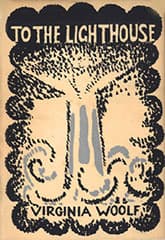To the Lighthouse
Critique • Quotes
 First edition
First editionFirst publication
1927
Literary form
Novel
Genres
Literary
Writing language
English
Author's country
England
Length
Approx. 81,500 words
Life of the mind makes a lifeless novel
This novel hasn't a single character one is likely to care about.
Normally this would be the death knell for a piece of fiction. But somehow To the Lighthouse won immediate acclaim upon publication in 1925 and has ever since been acknowledged as a classic of modern literature.
It certainly is influential at any rate. Virginia Woolf's hypersensitive approach to characters' perceptions and her finely detailed interior monologues rendered in near-poetic prose have been imitated by a century of mostly female writers.
Narrative, even more so than in Woolf's Mrs Dalloway, is minimal. The whole first part of the novel takes place during the second half of a day as the Ramsay family, along with their academic and artistic friends staying with them at their summer home, consider a trip to an island with a lighthouse. But even this scrap of plot serves only a symbolic purpose. We spend hours in the heads of the characters as they ponder their relations with each other, and the relation of social organizer and mother of eight Mrs Ramsay with her renowned philosopher husband.
Strange interlude
The most momentous event, which changes everything, is dispatched by Woolf in a parenthetical remark, as though she is embarrassed to raise such a nasty issue as death and people's tawdry emotions toward it.
In a strange interlude called "Time Passes" the point of view shifts from the characters to...well, it's hard to tell. The house's point of view? The world's? Time's?
Ten years later the surviving family returns to the house and completes the boat trip to the lighthouse. Again we see everything through the consciousness of the characters. Because of a greater focus on the adolescents, this section is less intellectual, though precious enough.
I have read critics who say that between Mrs Dalloway and To the Lighthouse, Woolf refined her stream-of-consciousness approach to give each character greater definition. But to me they still pretty well all sound the same. Which is how I imagine Woolf herself would sound. And they are even less interesting than the characters in Mrs Dalloway. I really could not care less about the minor intrigues among these lifeless, self-absorbed intellectual drudges.
Again though, let me point out that Woolf is quite brilliant in capturing elusive perceptions and thought. One wonders if her sensibility might not have made her a greater poet where the need for three-dimensional characters, intriguing narrative and passion for life are not required to such a degree.
However, I realize I'm likely in a minority, as established literary opinion ranks her as a great novelist with To the Lighthouse supposedly her most popular novel.
— Eric
Critique • Quotes

